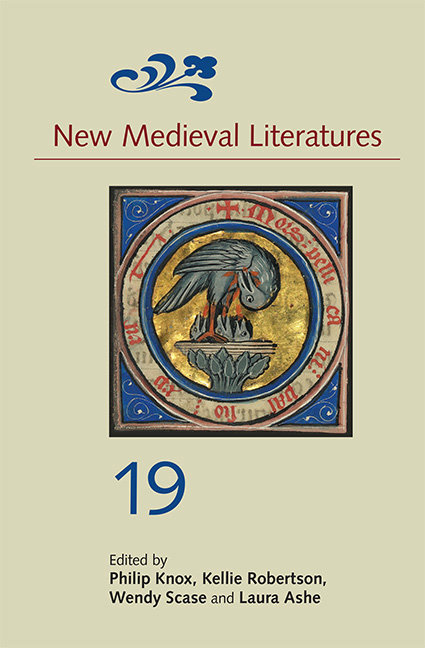Book contents
- Frontmatter
- Contents
- 1 A Scottish or English Saint? The Shifting Sanctity of St Aebbe of Coldingham
- 2 Monastic History-Writing and Memory in Britain and Ireland: A Methodological Reassessment
- 3 Language, Morality, and Wordplay in Thirteenth-Century Anglo-French: The Poetry of Walter de Bibbesworth
- 4 Open Form and Canonic Matter in Trecento Song
- 5 ‘Uninhabited’: Eco-Colonial Anxieties in Late Medieval Icelandic Saga
- 6 ‘Betwen tuo stoles’: The Western Schism and the English Poetry of John Gower (1378–1417)
- 7 Cognition and Conversion in Alain Chartier's Livre de l'Espérance
2 - Monastic History-Writing and Memory in Britain and Ireland: A Methodological Reassessment
Published online by Cambridge University Press: 31 August 2019
- Frontmatter
- Contents
- 1 A Scottish or English Saint? The Shifting Sanctity of St Aebbe of Coldingham
- 2 Monastic History-Writing and Memory in Britain and Ireland: A Methodological Reassessment
- 3 Language, Morality, and Wordplay in Thirteenth-Century Anglo-French: The Poetry of Walter de Bibbesworth
- 4 Open Form and Canonic Matter in Trecento Song
- 5 ‘Uninhabited’: Eco-Colonial Anxieties in Late Medieval Icelandic Saga
- 6 ‘Betwen tuo stoles’: The Western Schism and the English Poetry of John Gower (1378–1417)
- 7 Cognition and Conversion in Alain Chartier's Livre de l'Espérance
Summary
This article analyses the formal and conceptual range of many different types of monastic history-writing during the central Middle Ages (c.900– c.1300) via a nuanced account of the monastic practices of memory in central medieval Ireland and Britain. The modern disciplines of History and Literature have focused on somewhat different aspects of memorial culture during the Middle Ages – broadly speaking, these have been ‘social memory’ in History and ‘the art of memory’ in Literature. This article looks to both social memory and the art of memory (and thus, to both historical and literary scholarship) in order to identify the means by which nuns and monks integrated history-writing with other educational, political, and artistic pursuits associated with memory. Memory Studies helps us address potential deficiencies in ideological readings of monastic writing as well as in conventional descriptions of monastic history in terms of genre and style. This article belongs to a broader trend in medieval literary criticism that considers forms of practice and affective response as alternatives to content and form as the basis for generic comparison. I am thus interested in the memorial practices that unite text-types that are usually contrasted or kept separate such as romance and annalistic chronicle. My arguments will be of most use to literary critics, but it is hoped that historians, too, might find something of value in arguments about the problems raised by the imposition of generic categories and by standard political and economic readings of monastic historiography.
My specific suggestions are these. First, the term ‘monastic’ that we assign to certain text-types and deny to others is very often misleading as an indicator of literary meaning, because ‘monastic’ meant many different things in theory and in practice during the Middle Ages and monastic libraries were never limited to typical ‘monastic’ texts. Neither generic typology nor accounts of mentality will suffice for articulating the relationship between monastic status, on the one hand, and the origins, aesthetics, or use of particular historical texts on the other. My second suggestion therefore is that a paradigm of memorial practices, fleshed out by the work of both History and Literature scholars working in Memory Studies, provides a better analytic framework.
- Type
- Chapter
- Information
- New Medieval Literatures 19 , pp. 43 - 88Publisher: Boydell & BrewerPrint publication year: 2019



